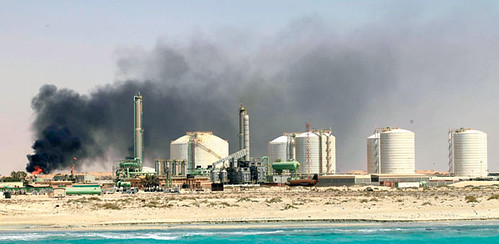
Zueitina oil terminal located near Benghazi, Libya has been the scene of labor unrest. The industry in Libya is no facing a downturn in production after the imperialist overthrow of Gaddafi., a photo by Pan-African News Wire File Photos on Flickr.
Libya threatens army action against oil protesters
Thu, Aug 15 2013
By Feras Bosalum
TRIPOLI (Reuters) - Libya's rebel government will use all means, including military force if necessary, to prevent striking security guards at the country's main ports from selling its oil independently, Prime Minister Ali Zeidan said on Thursday.
In a critical challenge to the government, strikes at Libya's largest ports have pushed oil production and exports, the lifeblood of the north African country's economy, to their lowest levels since the civil war that ousted veteran revolutionary leader Muammar Gaddafi in 2011.
Libyan supply disruptions have helped push oil prices to their highest levels since April alongside unrest in neighbouring Egypt where hundreds of people were killed this week in clashes between security forces and protesters.
Libyan officials said their patience with protesters was running out as the country was losing billions with its oil exports more than halved in the past weeks.
Prime Minister Zeidan said that the leader of the protesters, Ibrahim al-Jathran, who is the regional head of the Petroleum Facilities Guard, wanted to sell the oil independently of Libya's state national oil corporation (NOC).
"The head of the protesters wants to export oil for their own group, they do not want to make concessions," Zeidan told a news conference.
"If any tanker comes to the port to pick up oil, then we will use any means to stop it," he said. This could involve the army, navy or air force, he added.
The protests are located mainly in the eastern part of Libya, which has been pushing for greater autonomy since starting the uprising against Gaddafi.
The strikes have hit major oil export sites such as Es Sider and Ras Lanuf with armed security guards asking for higher pay. No comment was immediately available from the protesters, who have not publicly threatened to sell oil independently.
Export problems have reduced Libya's output to just 500,000-600,000 barrels per day compared to the country's production capacity of 1.6 million bpd representing over 1.5 percent of the global oil output.
Libyan supply outages have been aggravated by disruptions in Iraq, Nigeria and South Sudan as well as lower exports from Russia, Azerbaijan and Kazakhstan, which have all hit hard European oil buyers.
Libya has joint projects with many Western majors such as Italy's ENI and many firms have reported lower sales and higher financial losses this year, citing Libyan unrest.
BILLIONS LOST
Oil Minister Abdelbari al-Arusi told the same news conference all Libyan export ports were shut by protests except for Zawiya in the west.
"Libya has lost $1.6 billion in oil sales since July 25 until today," al-Arusi said. "We have lost a lot of our clients and they are now searching for other providers," he added.
OPEC oil member Libya told its customers earlier in the week it could make no promises on crude deliveries next month as strikes paralysed its major terminals.
On Thursday, officials said strikes were still crippling the main facilities despite hopes the disputes would be at least partially resolved this week.
"We will use force to stop any tanker from entering waters without a contract with NOC," Libya's counter-revolutionary defence minister Abdallah Al-Thani told the same news conference.
(Writing by Julia Payne and Dmitry Zhdannikov,; Editing by Mark Trevelyan)
No comments:
Post a Comment